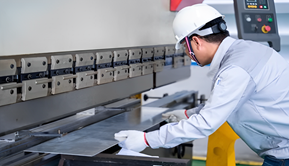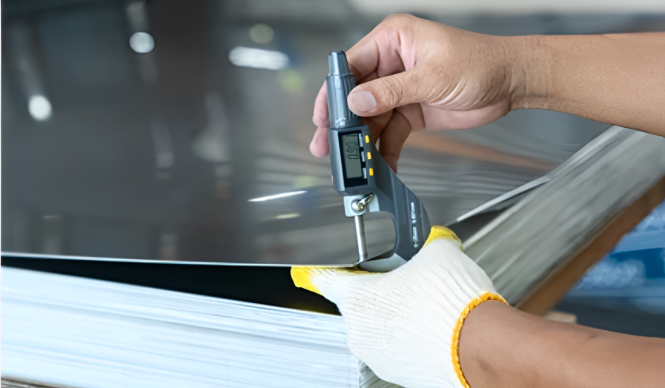Does Titanium Rust? – What You Need to Know?
Metals that rust suffer structural weakening and require expensive fixes. Since titanium stands out for its durability and strength you may be wondering if it can resist rust. Metals do not rust uniformly in all situations. This article explains the rust resistance of titanium metal plus highlights how it outperforms other metals and its useful applications. Let’s uncover the facts.
What is Rust?
Rust is iron oxide. The reaction between iron and oxygen in wet conditions creates rust. Only iron and steel products with iron in their composition can rust. Oxidation reacts with iron and weakens the metal structure over time. Rust develops into a reddish-brown layer and damages metal structures.

What is Corrosion?
Chemical reactions between metals and their surroundings cause damage called corrosion. It affects various metals. Metals degrade through four main processes: oxidation with oxygen, galvanic corrosion between different connected metals, pitting that harms small areas, and crevice corrosion within tight spaces. Identifying these forms of corrosion enables you to build better strategies for protecting materials.

What is Titanium?
Titanium at atomic number 22 exists naturally in Earth’s crust as a durable lightweight material. Titanium performs well in many industries including aerospace medicine and manufacturing because of its anti-corrosive abilities and lasting design. Titanium in its pure form provides ideal compatibility for medical use while titanium mixture compositions improve strength and temperature tolerance.

| Sr. No. |
Property |
Commercially Pure Titanium (Typical) |
Ti-6Al-4V (Typical) |
| 1 |
Chemical Composition |
Primarily Ti, with trace elements (O, N, Fe, C, H) |
Ti, 6% Al, 4% V, trace elements |
| 2 |
Tensile Strength (MPa) |
240-550 |
895+ |
| 3 |
Yield Strength (MPa) |
170-480 |
825+ |
| 4 |
Density (g/cm³) |
~4.5 |
~4.43 |
| 5 |
Melting Point (°C) |
~1668 |
~1604-1668 |
| 6 |
Elastic Modulus (GPa) |
~103-116 |
~110-120 |
| 7 |
Elongation at break (%) |
15-25 |
10-15 |
Rust vs. Titanium Oxidation
Titanium stays rust-free because it lacks iron in its composition. Rust develops when iron mixes with oxygen and water to form iron oxide. While titanium goes through oxidation it develops a titanium dioxide shield to protect itself. The titanium dioxide layer acts as protection while rust gradually damages the iron structure. The rust flakes reveal fresh metal parts that need protection from breakdown. The titanium dioxide layer continues to protect the material as it stands strong. Titanium stands out from other metals because it resists corrosion which makes it perfect for aerospace medical and marine industries.

Why Titanium is Resistant to Rust and Corrosion
Formation of a Protective Oxide Layer
In the presence of oxygen, titanium forms a thin layer of titanium dioxide (TiO₂). One barrier layer which prevents further oxidation. It doesn’t flake or weaken like rusty iron does. Instead, titanium is made stronger to resist corrosion.
Self-Healing Properties of Titanium Oxide Layer
The oxide layer regenerates immediately (instantaneously) if scratched or damaged. This self healing ability ensures a long lasting protection in harsh conditions. Titanium is therefore durable and reliable and therefore a top choice for demanding applications.
Chemical Inertness and Corrosion Resistance
As compared to stainless steel or aluminum, titanium is highly resistant to acids, bases and saltwater. Unlike these metals, it does not pit or corrode with time. This is very valuable for marine, medical and industrial settings.
Stability in Harsh Environments
Titanium can withstand high temperatures and high pressures without degrading. It is so important for aerospace, deep sea and medical applications where strength and durability are paramount.
No Iron Content to Cause Rust
Titanium is a non ferrous metal (without iron). Rust is created when iron reacts with oxygen and moisture and titanium is rust free because it is of iron. This is a major reason it can outperform steel in corrosive environments.
Factors Affecting Titanium’s Resistance to Corrosion
Environmental Conditions
Extreme temperatures, high humidity and exposure to chemicals damage titanium’s corrosion resistance. Titanium is resistant to corrosive environments, particularly in acidic environments, provided that the acid concentration does not exceed a certain range. Prolonged exposure can affect the surface integrity, while it generally resists degradation in alkaline conditions.
Alloy Composition
The pure titanium (Grade 2) has excellent corrosion resistance, but strength is low. Small amounts of aluminum and vanadium are added to Grade 5 titanium alloys to improve the mechanical properties, and slightly change the corrosion behavior. Molybdenum is resistant to harsh environments.
Surface Finish and Treatments
Polished, anodized and chemically treated surfaces are used to strengthen titanium’s protective layer. In addition, anodization provides for increased oxidation resistance. Different finishes have long term durability and affect the oxidation rate.
Oxygen and Passive Film Formation
Titanium is naturally protected by a stable oxide layer that prevents against corrosion. This layer regenerates after it’s damaged and helps you resist for a long time.
Mechanical Stress and Wear
Bending or impact can weaken the oxide layer and expose the titanium to possible corrosion. Extreme conditions leading to compromising of structural integrity, situations where stress corrosion cracking can occur.
Comparing Titanium’s Corrosion Resistance to Other Metals
Titanium vs. Stainless Steel
The chromium oxide surface on stainless steel protects against rust but the metal develops pits in salty environments. Titanium with its titanium dioxide coating resists corrosion better than other materials including saline water and acid environments. The protective layer of titanium remains stronger than the barrier of stainless steel.
Titanium vs. Aluminum
Both form protective oxide layers, but titanium’s is stronger and more durable. Aluminum breaks down in saltwater but titanium maintains its strength because its oxide layer is durable. Engineers choose titanium because it keeps performing when aluminum products fail in marine environments.
Titanium vs. Other Corrosion-Resistant Metals
Nickel alloys stay strong under strong acids and alkalis yet copper-based materials work best in air and seawater environments. In comparison titanium withstands harm better across multiple types of corrosive environments particularly against oxidizing acids. Titanium ranks highest for critical jobs because its strength-to-weight balance and superior corrosion shielding properties. A certain nickel alloy performs better than copper in chemical processes while copper works best for carrying electricity.
| Feature |
Titanium (Ti) |
Stainless Steel (SS) |
Aluminum (Al) |
Nickel Alloys (Ni) |
Copper Alloys (Cu) |
| Chemical Composition (Main) |
>99% Ti |
Fe, >10.5% Cr, Ni, etc. |
>90% Al |
>50% Ni, Cr, Fe, etc. |
>60% Cu, Zn, Sn, etc. |
| Density (g/cm³) |
4.51 |
~7.7-8.0 |
2.7 |
~8.9 |
~8.9 |
| Tensile Strength (MPa) |
~240-1400 (varies by grade) |
~515-860 (varies by grade) |
~90-600 (varies by alloy) |
~480-1100 (varies by alloy) |
~200-700 (varies by alloy) |
| Corrosion Resistance (General) |
Excellent (seawater, acids) |
Good (atmospheric, mild acids) |
Fair (atmospheric, neutral pH) |
Excellent (strong acids, alkalis) |
Good (atmospheric, seawater) |
| Passive Layer |
TiO₂ (titanium dioxide), very stable, ~1.5-10nm thick |
Cr₂O₃ (chromium oxide), self-healing, ~2-5nm thick |
Al₂O₃ (aluminum oxide), less stable in extreme pH |
NiO, Cr₂O₃ (varies), very stable |
CuO, Cu₂O (varies), less stable in acidic conditions |
| Saltwater Corrosion |
Stable |
Can pit/crevice corrode |
Corrodes |
Excellent |
Good, some pitting |
| Acid Resistance |
Excellent (oxidizing acids) |
Variable (poor in some acids) |
Poor |
Excellent (strong acids) |
Poor (acids) |
| Oxide Layer Thickness |
~1.5-10nm |
~2-5nm |
~2-8nm |
variable |
variable |
| Mechanical Strength |
High strength-to-weight ratio |
Variable, good strength, ductility |
Low strength, lightweight |
High strength, excellent high temp performance |
Moderate strength, good conductivity |
Real-World Applications of Rust-Resistant Titanium
Aerospace Industry
Titanium is used to make aircraft frames, engines and fasteners. This offers excellent corrosion resistance to aircraft operating in extreme weather, so that maintenance is minimized. Such durability makes the life span of the aircraft longer and it is an economically viable option for the aviation industry.
Marine Industry
Titanium is well suited for ship hulls, propellers, offshore structures and underwater equipment. Stainless steel or aluminum is less prone to saltwater corrosion and does not cause structural degradation. For marine applications, this is a superior choice due to its longevity.

Medical Applications
In the medical field titanium is used for implants, prosthetics, surgical tools, and dental fillings. The corrosion resistance of the metal prevents the metal breakdown inside the body resulting in the metal being long lasting. But it also protects against risk of adverse reaction in medical advancements involving it, a factor which makes it a preferred material.
Chemical Processing Industry
Titanium is used in bins, tanks, piping and heat exchangers in highly corrosive environments. It is more durable than stainless steel, and lasts longer and is more reliable than stainless steel in extreme chemical exposure.
Automotive Industry
Titanium is also used on high performance vehicles in reducing the exhaust systems, suspension components, and other parts. Its corrosion resistance improves durability and lowers the need for maintenance.
Power Generation
Titanium is used in nuclear power plants, desalination systems and geothermal energy infrastructure. Its rust resistance makes it one of the key materials for sustainable energy solutions in extreme environments.
How to Enhance Titanium’s Corrosion Resistance
Anodizing
Anodizing thickens titanium’s oxide layer, causing it to be more resistant to corrosion. It enhances the surface hardness and wear resistance through an electrochemical route. Variations of the anodized titanium are available in different colors, so it provides both aesthetic as well as the same level of durability.

Physical Vapor Deposition (PVD) Coatings
PVD applies thin film coatings that improve both wear and corrosive resistance. These coatings frequently use nitrides and carbides due to their formation of a strong protective layer. PVD is applied widely in aerospace and medical applications where durability is essential.

Passivation
For example, it uses an acid treatment to passivate the surface, removing surface contaminants such as iron or other impurities. The outcome is an enhanced corrosion resistance due to strengthened oxide layer. In medical and aerospace industries, pure, long lasting titanium is of great importance.

Protective Surface Finishes
Methods like electropolishing, sandblasting and chemical treatments can prevent corrosion. It smoothes the surface, reducing the sites for corrosion initiation. Sandblasting removes impurities and chemical treatments add to the protective properties.

Alloying with Noble Metals
However, adding palladium or ruthenium helps a great deal to improve titanium‘s corrosion resistance. These noble metals can provide stability under agressive conditions such as seawater or acidic conditions. This method is commonly used in chemical and marine industries.

Polymer Coatings
Fluoropolymer or epoxy coatings are applied to form a barrier against aggressive chemicals. They protect the titanium from direct contact with corrosive agents and make it appropriate for industry and medicine. In addition, it is also resistant to oxidation and moisture.

Cathodic Protection
Cathodic protection against corrosion is provided by means of a sacrificial anode or impressed current system. In marine and industrial settings, titanium is left intact, but sacrificial anodes corrode instead. In addition, controlled electrical charge is added in impressed current systems to further reduce the risk of corrosion.

Addressing Common Myths About Titanium and Rust
Does Titanium Rust in Water?
People often have incorrect ideas about titanium’s behavior against rust and corrosion. People wonder if titanium behaves like iron and steel when placed in water. Titanium does not react with water including saltwater. A natural oxide layer on titanium keeps it safe from corrosion and works well in all water types and damp surroundings.
Can Titanium Corrode?
Titanium resists rust but breaks down when exposed to extreme conditions. Titanium experiences crevice and galvanic corrosion when submerged in very acidic water or touching dissimilar metals. These corrosion risks typically happen in limited special circumstances.
Does Titanium Develop Color Variations Through Long-Term Exposure?
Over time titanium develops different colors without compromising its core strength. The metal develops a range of surface colors through heat treatment or controlled oxidation processes. Anodization helps create titanium colors for jewelry and medical implants without reducing performance.
Conclusion
Titanium stands out as a preferred material because it resists damage in challenging environments. Titanium keeps going strong because it forms a protective oxide layer that repairs itself without rusting. The material withstands tough conditions perfectly across aerospace, marine, medical, and chemical fields. Its better strength results compared to stainless steel and aluminum shows why it matters in production. When working at extreme depths and high temperatures titanium maintains its stable performance. Titanium proves to be the smartest choice for businesses looking to keep their equipment resistant to rust and durable over many years.
FAQs
Does titanium steel rust?
Yes, titanium steel rusts, but only if it contains iron, as it is an alloy with a different composition.
Does titanium jewelry rust?
Pure titanium jewelry does not rust, but if the alloy contains other metals, it may corrode over time.
Does a titanium ring rust?
It is naturally resistant to oxidization, so the pure titanium ring will not rust.
Does titanium exhaust rust?
Titanium exhaust systems will not rust but may develop a discoloration and oxidation in extreme conditions.
How long does it take for titanium to rust?
Under normal conditions pure titanium will never rust and therefore is corrosion free forever.
















One Response